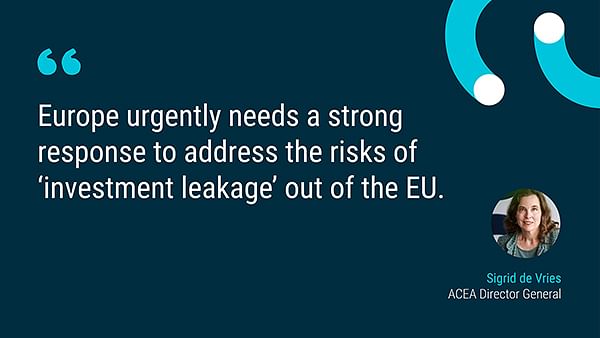ACEA urges EU leaders to act on eroding auto industry competitiveness
European Automobile Manufacturers’ Association president Luca De Meo says vehicle manufacturers are facing huge challenges and no longer leading the technological race.
The European Automobile Manufacturers’ Association (ACEA) has re-iterated its call to speed up action to secure the EU’s industrial base during the green transition. The two-day European Council Summit, where EU leaders address EU competitiveness, is currently underway in Brussels.
Speaking at a hearing in the European Parliament in Brussels on March 21, ACEA President and CEO of Renault Group, Luca de Meo stated: “Europe and its auto industry are at a turning point. The challenges are huge, as is the pressure on the auto industry.”
"Today, European vehicle manufacturers are facing a very asymmetrical challenge. We are no longer leading the technological race,” said de Meo. “At the same time, as purchase incentives for zero-emission vehicles wane in the EU, we note massive support to our competitors in China and the US. All of this is happening in a context where overall European competitiveness is eroding.”
“Our message to EU policy makers is that it is possible to improve air quality, reduce climate impact and maintain competitiveness all at once,” added Luca de Meo.
ACEA Director General, Sigrid de Vries, explained: “A major challenge for the automotive sector over the last years has been the sheer volume of new legislation, spanning from tailpipe CO2-emissions reduction to the incorporation of sustainability and due diligence criteria into automotive-related legislation. And while the legitimacy of these initiatives is not in question, and industry heavily invests in delivering on their goals, Europe can and should do better for legislation to be coherent, achievable and competitive in a global context.”

"The recent Euro 7 proposal on pollutant emissions is a prime example of a regulation that will add complexity and uncertainty to key decisions and investments of European vehicle makers, without bringing the environmental benefits it claims to deliver,” she continued.
The Euro 6 standard in place today, together with the ramp up of electric vehicles, has the potential to deliver an 80% reduction in NOx emissions by 2035 compared with 2020. The Euro 7 proposal would bring at most 4 additional points for cars, and 2 additional points for trucks. This marginal impact would come at a high cost: ACEA estimates that the Euro 7 proposal would result in an increase of 2,000 euros (Rs 175,000) to the price of a new car on average. This means that many people would be forced to extend the lives of their old cars, with a counterproductive effect on the environment and climate.
"Since fleet renewal is the most powerful tool to curb both CO2 and pollutant emissions, we should be looking for ways to accelerate it,” said de Meo. “We must also consider additional opportunities, using the right tools and acting where it makes sense. For air quality, we should focus on big urban areas, respecting the subsidiarity and proportionality principles, because this is where it is a real issue.”
ACEA represents the 14 major Europe-based car, van, truck and bus makers comprising the BMW Group, DAF Trucks, Daimler Truck, Ferrari, Ford of Europe, Honda Motor Europe, Hyundai Motor Europe, Iveco Group, Jaguar Land Rover, Mercedes-Benz, Renault Group, Toyota Motor Europe, Volkswagen Group, and Volvo Group.
Around 13 million Europeans work in the automotive sector, which accounts for 11.5% of all manufacturing jobs in the EU. The sector provides 374.6 billion euros in tax revenue for European governments and enables a 79.5 billion euros trade surplus for the European Union. According to ACEA, almost 8% of EU GDP is generated by the auto industry which also spends 58.8 billion euros in R&D annually, 32% of the EU total.
RELATED ARTICLES
Autoliv Plans JV for Advanced Safety Electronics With China’s HSAE
The new joint venture, which is to be located strategically near Shanghai and close to several existing Autoliv sites in...
JLR to Restart Production Over a Month After September Hacking
Manufacturing operations at the Tata Group-owned British luxury car and SUV manufacturer were shut down following a cybe...
BYD UK Sales Jump 880% in September to 11,271 units
Sales record sets the UK apart as the largest international market for BYD outside of China for the first time. The Seal...






 By Autocar Professional Bureau
By Autocar Professional Bureau
 24 Mar 2023
24 Mar 2023
 4689 Views
4689 Views





 Ajit Dalvi
Ajit Dalvi




